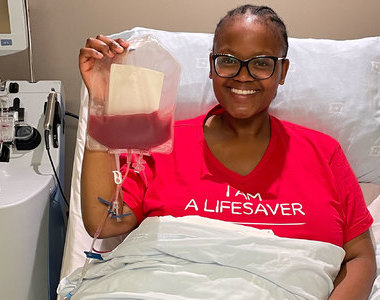Children with disabilities must be part of nation building
17 July 2020 | Story Helen Swingler. Photo Adobe Stock. Voice Sarin Drew. Read time 6 min.
The Human Rights Watch estimates that 600 000 South African children with disabilities were not at school last year, an indictment on our society which needs every child to participate in nation building, University of Cape Town (UCT) Vice-Chancellor Professor Mamokgethi Phakeng said.
Phakeng was delivering the introductory address on the first of the two-day Teaching Empowerment for Disability Inclusion (TEDI) symposium webinar. This was held virtually on 15 and 16 July.
The TEDI project in the Division of Disability Studies in the Department of Health and Rehabilitation Sciences, in the Faculty of Health Sciences, is a partnership with Christoffel-Blindenmission (CBM) and co-funded by the European Union (EU). Associate Professor Judith McKenzie is TEDI’s principal investigator. The project works in close partnership with the universities of the Witwatersrand, Johannesburg and Pretoria; national and provincial education departments; special schools; and NGOs.
The webinar brought together teachers, disability activists, parents, government, academia and representatives of the EU and CBM. Among the participants was new UCT Council member Marlene le Roux, an advocate for disability rights.
Protests all about inclusion
Recent protests around the world, such as Black Lives Matter, were all about inclusion, Phakeng added, “disrupting old systemic attitudes and dismantling prejudices”.
“They’re about including people who have been marginalised in one way or another. Inclusivity means opening up minds and hearts across society, to bring lasting transformation to the ways we relate to each other.”
She said that TEDI worked to achieve the same goals for children born with disabilities and that the country’s poor record in achieving this was out of line with the United Nations Convention on the Rights of Persons with Disabilities, as well as our Constitution and the goals of the Education White Paper on Special Needs Education: Building an Inclusive Education and Training System.
Figures from the Department of Basic Education show that 24.6% of people with disabilities aged 20 and above had either no schooling or only some form of primary schooling, Phakeng said.
“Like all children, they need education,” she continued, citing the United Nations Educational, Scientific and Cultural Organization’s 2020 Global Education Monitoring Report. This states that children with disabilities are particularly at risk of exclusion from education.
“To help children with disabilities interact with society and culture, teachers and parents need to be empowered.”
“To help children with disabilities interact with society and culture, teachers and parents need to be empowered to help them live and grow in schools and the wider community,” said Phakeng.
Education focused on inclusivity
Phakeng was a teacher herself and knows the importance of inclusivity in education. She began her career in the Department of Education and Training as a mathematics subject advisor and developed in-service training programmes with senior primary mathematics teachers. She also taught mathematics in high school. In 2008 she co-chaired a study on mathematics and language diversity, commissioned by the International Commission on Mathematical Instruction, and was the first black South African researcher to do so.
To ensure their resources are widely available, TEDI has developed short, face-to-face courses and accompanying massive open online courses (MOOCs) for educators, focusing on: disability studies in education; the education and care of learners with severe to profound intellectual disabilities; teaching learners with visual impairment; and teaching learners who are deaf or hard of hearing.
“And in South Africa, enrolments for these MOOCs had surged since the onset of COVID-19.”
Phakeng said these online courses had reached more than 8 700 people in countries as diverse as the United States, India, Canada, the Philippines, the United Kingdom, Australia, Mexico, the United Arab Emirates, Egypt, Singapore and Russia. And in South Africa, enrolments for these MOOCs had surged since the onset of COVID-19.
Accredited research unit
The vice-chancellor said that UCT would continue their work in the field through an accredited research unit, Including Disability Education in Africa (IDEA). This will provide in-depth analysis of TEDI’s data on teacher empowerment, disability inclusion, and the overall landscape of teacher education to support disability inclusion.
IDEA will also conduct comparative studies of inclusive education in the global south, largely driven by research students from other African countries, building capacity across the continent.
Following on, Dr Moses Simelane, chief director (curriculum implementation and monitoring) in the Department of Basic Education, said the department had been guided by Sustainable Development Goal 4. This provided strategic direction for education systems around the world, aiming at inclusive and equitable quality education and lifelong opportunities for all.
In South Africa, this means developing teachers in the use of inclusive practices and ensuring they’re able to provide differentiated approaches to education that include children with disabilities.
“At basic education [level] we need to develop an inclusive education system that will contribute towards the development of skills, knowledge and practices for individuals with special education needs.”
The department had worked closely with McKenzie and her team over the years to develop a teacher education programme that would empower our teachers to accommodate diverse learners in the classroom. This included special care centres for learners with severe to profound intellectual disability.
Simelane said that UCT’s MOOCs had been invaluable in helping teachers and caregivers around the country access resources during the COVID-19 pandemic.
The aim, he said, was to ensure that no child is left behind.
 This work is licensed under a Creative Commons Attribution-NoDerivatives 4.0 International License.
This work is licensed under a Creative Commons Attribution-NoDerivatives 4.0 International License.
Please view the republishing articles page for more information.
Listen to the news
The stories in this selection include an audio recording for your listening convenience.























































































































































































































































































































































































